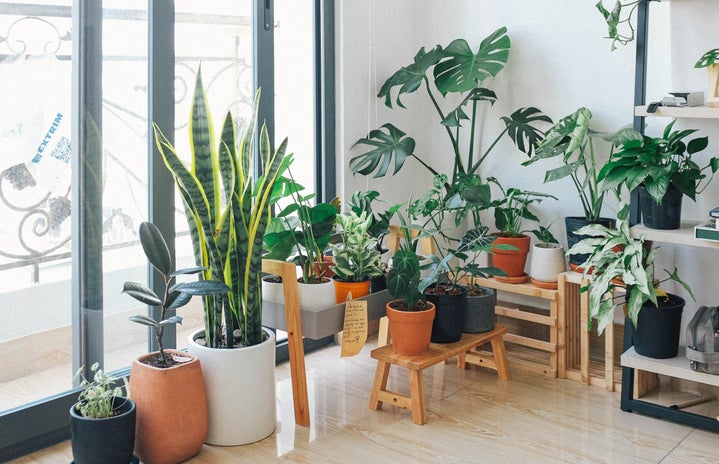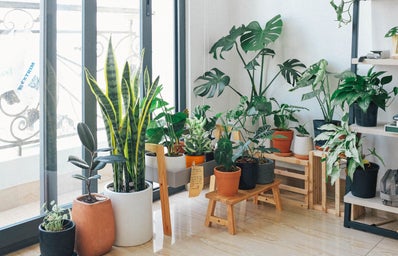Close your eyes and imagine paradise. Where are you? What surrounds you? My shut eyelids transport me to the mountains, where fog kisses the leaves good morning, and the trees stand alongside each other for miles on end. My paradise is filled with luscious greenery and blue skies. I feel most at peace when in nature.
Biophilia, a term brought to light by philosopher Erich Fromm and popularized by naturalist Edward O. Wilson, suggests that humans are inevitably drawn to nature and have an instinctual love for the outdoors.
Biophilic design is a concept that encourages bringing the outdoors in to reinvigorate our innate connection with nature. Common design elements of this concept are incorporating natural wood tones, shades of green and blue and of course, plants. The rise of biophilic design can be seen through vast companies like Facebook, which has created nature-infused spaces for its employees to thrive. Through the use of biophilic design to create a motivating work environment, Facebook employees can now head to the rooftop garden and work amongst the greenery that’s visible from every angle.
There aren’t many of us, especially during the pandemic, who have the luxury of escaping to a manicured and lusciously green workspace to complete our tasks. Most of us are still stuck in our rooms and homes, growing stale along with our environments. Traditional offices may be closed, but our laptops and at-home workspaces have been open around the clock for over a year now, leaving us exhausted.
The Environmental Health Department at Harvard T.H.Chan School of Public Health conducted a study in which 100 participants were randomly assigned to experience one virtual reality office after completing stressor tasks. Three offices used varying elements of biophilic design such as indoor greenery and an outdoor view. There was one non-biophilic office experience. Using biomonitoring sensors, the participants’ heart rates, blood pressures and other physiological indicators of stress/anxiety were measured once they entered the office after the stressor tasks.
Participants in the biophilic office environments had quicker recovery responses in terms of decreasing stress and anxiety levels in comparison to the ones experiencing the non-biophilic office. The physiological responses and feelings of calmness were seen in participants in four to six minutes. This and other studies have proven the benefits of incorporating plants and nature into the workspace with productivity and creativity levels increasing only being a few on the list.
We’ve learned first-hand from the pandemic how important our spaces are to our well-being. It’s no surprise that the areas in which we live directly affect our moods and behaviors. Everything around us has energy, just like we do, and can impact us immensely, according to feng shui consultant Karen Carter.
Carter explains feng shui as an ancient Chinese method for mindfully arranging your environment so it supports you. Within feng shui, there are five elements: wood, metal, water, earth and fire. Plants are a part of the wood element which represents growth, big ideas and fresh new energy.
“When we are around healthy, natural, thriving energies, we have a better chance of thriving ourselves,” Carter said.
Many people are clueless about the effects their environment is having on them. More often than not, we are consumed by work and other aspects of life that we fail to think about the impact of our spaces. One of the goals of feng shui is to make the places we spend our time healing and nourishing. While you might think an office or workspace should be focused on grinding out work and hustling, it’s oftentimes where we need the most support from our environment. Piles of papers and tangled wires don’t only create a messy workspace, they’re the perfect ignition for the mental fire that is burnout.
So, how can we implement feng shui and biophilic design into our workspaces so we can reap the benefits?
Plants are the obvious start as they bring life and color into your workspace. When trying to nurture ourselves, it’s good practice to care for another living being. Carter uses the metaphor of tending to a flower that you want to bloom. If you are trying to get the flower to grow, you wouldn’t abandon it or smack it around, you’d care for it in all aspects. You’d water it and make sure it’s getting enough sunlight, checking up on it constantly to see even the tiniest amount of growth. We should be doing the same for ourselves.
“It’s the circle of life,” Carter said. “We want to be on the growing and blooming side of life, not the dying half.”
If you’re intimidated by plants due to a not-so-green thumb, there’s no worry. Opt for other decorative elements such as artwork or fake plants in an attempt to liven up your workspace. Carter recommends using photographs of nature instead of abstract art. The closer you can get to the real thing, the better. Placement of artwork is crucial, as is any placement within feng shui. While you should be facing the entryway or window head-on, behind your back is where the artwork should live. Carter suggests having photos of trees behind you. Trees represent strength, stability, and growth.
“Think about redwoods,” Carter said. “They’ve been around for decades and are still sturdy and growing.”
Redwood trees are a symbol of longevity. They make for a beautiful background for all fellow Zoomers to see during your calls. Whether you aspire to have a lengthy and prosperous career or need to continue growing professionally, placing photographs of trees behind you is a great way to bring resilience into your workspace/office and ultimately, your life.
While living, growing plants are optimal, fake plants are acceptable. Carter recommends feeding a few spoons of spoil into the pot of the plant despite it being fake. Nurture it as if it were a real, blossoming plant.
“Feng shui is all about intention,” Carter said.
If you feel comfortable with plants and are ready to invite them into your workspace to absorb their benefits, feng shui consultant Marianne Gordon has a list of favorite plants she recommends.
“Plants have activating energy,” Gordon said.
This energy makes them great for inducing positivity within you and your workspace. Basil and lavender can help reduce stress and anxiety while looking cute and quaint sitting on your desk. Not only does the fresh scent linger through your room, but it also dances beneath your nose bringing you back to a calmer state.
Air-purifying plants are especially important now due to the pandemic and all of the cleaning chemicals we are bringing into our spaces. Gordon recommends the areca palm or the snake plant and suggests placing it near the door to zap away any chemicals or bad energies lingering in the air or attempting to enter your workspace. Not only this, but these plants are low-maintenance and beginner-level.
Within feng shui, each plant will offer different healing and manifestation properties. For example, if you are hoping your career will bring you monetary success, placing a jade plant, the money plant, on your desk would be an excellent way to invite that energy into your professional life. Orchids, a symbol of elegance and wealth, can be used for this purpose as well.
“When I worked at a Chinese bank, the owner would get shipments of orchids in constantly so we could have them and their energy around us,” Gordon said.
Spiky plants such as cacti should be avoided as they introduce negative and attacking energy into your workspace. Negative energy can also stem from dying or dead plants, and they should be removed from your space so they cannot drain you of precious energy. If you desire a low-maintenance plant that still has the cute factor of the cactus, try out succulents.
While it can be tempting to buy every plant that catches your eye, there is a danger in placing too many plants within your workspace or any room in general. Your intention of bringing in healing plants might be good, but according to Gordon and feng shui principles, balance is crucial. Having too many plants can overwhelm your space, which will in turn create chaos within you. She suggests sticking to one to two plants on your desk or in your workspace, maybe adding a plant tall in stature near the entrance, but highly recommends avoiding an excessive number of plants.
“Everyone on Instagram has jungles in their room,” Gordon said. “As much as I love jungles, too many plants can actually make your stress worse.”


